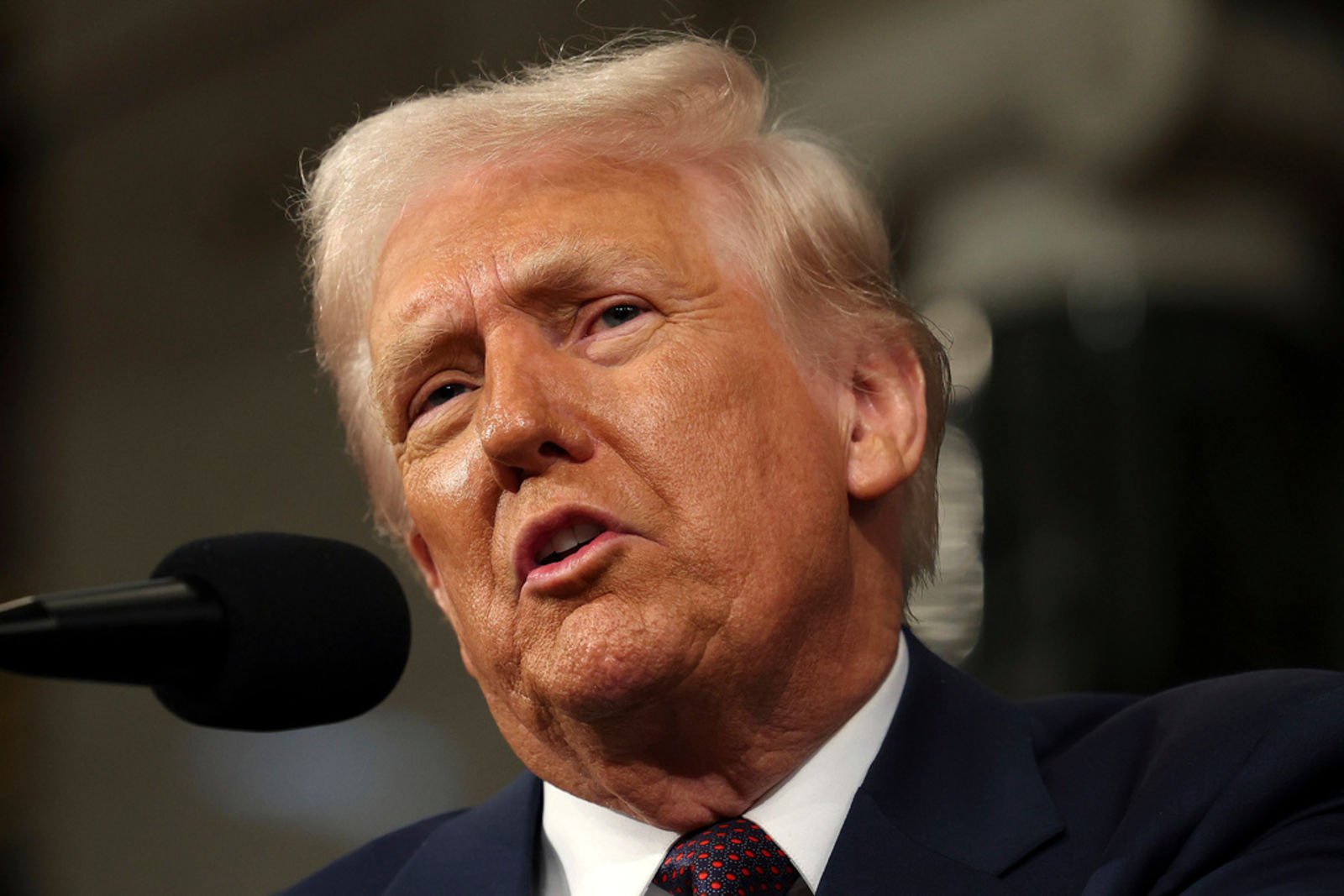
The Trump administration anticipates the 25% tariff will raise $100 billion in revenue, as ITV News Lora Jones reports
The government is “in intense negotiations with the US” to avoid being hit by Donald Trump‘s car tariffs, Chancellor Rachel Reeves has said.
On Wednesday, the US president announced 25% tariffs on all cars made outside the US, in a move which threatens to expand the global trade war.
In response to Trump’s announcement, the chancellor said she wants tariffs “to come down, not to go up, but I don’t think a trade war is good for anyone”.
When asked if she would levy tariffs in retaliation, Reeves insisted she did not want to see tariffs imposed on goods being exported to the US.
“I don’t want to see tariffs imposed. I don’t want to see tariffs go up. I believe in free and open trade, which is why we are in those intense negotiations at the moment.
“I will always put the national interest first because I want to secure jobs here in the UK, so no tariffs on Teslas.”
The fresh tariffs announced by Trump are due to take effect on April 2, or “liberation day”, as the president has called it.
White House Staff Secretary Will Scharf said the administration anticipated the 25% tariff would raise $100 billion in revenue.
Trump has long said that tariffs against car imports would be a defining policy of his presidency, betting that the costs created by the taxes would cause more production to relocate to the US.
Around four out of five cars made in the UK are exported.
Figures from industry body the Society of Motor Manufacturers and Traders show the US is the second largest export market after the European Union for cars built in the UK.
Some 16.9% of UK car exports were to the US last year.
Jaguar Land Rover could be one of the UK vehicle manufacturers most affected by tariffs.
In Europe, some of the biggest car manufacturers have seen their shares drop following the announcement.
Aston Martin, which is listed on the London Stock Exchange, saw its share price fall about 6% on Thursday morning.
Shares in German giant BMW Group, which includes Mini and Rolls-Royce Motor Cars, fell about 4%. Volkswagen Group, the parent company to Audi and Seat, fell around 3%.
Have you heard our podcast Talking Politics? Tom, Robert and Anushka dig into the biggest issues dominating the political agenda in every episode…
The UK’s car industry has criticised Trump’s announcement as “not surprising but, nevertheless disappointing”.
“If, as seems likely, additional tariffs are to apply to UK-made cars, it’s a blow to a long-standing and productive relationship,” said Mike Hawes, chief executive of the Society of Motor Manufacturers and Traders (SMMT).
“Rather than imposing new tariffs, we should be creating opportunities for both British and American manufacturers as part of a mutually beneficial relationship – benefiting consumers and creating jobs and growth on both sides of the Atlantic.”
Mr Hawes called on both sides to “come together immediately and strike a deal that works for all”.
US and foreign automakers with domestic plants still depend on Canada, Mexico and other nations for parts and finished vehicles, meaning that auto prices could increase and sales could decline as new factories take time to build.
“We are going to be doing automobiles, which you’ve known about for a long time,” Trump said Monday. “We’ll be announcing that fairly soon, over the next few days probably.”
Canadian Prime Minister Mark Carney said Wednesday that Trump’s car tariffs are a “direct attack” on his country and that the trade war is hurting Americans, noting that American consumer confidence is at a multi-year low.
“This is a very direct attack,” Carney said. “We will defend our workers. We will defend our companies. We will defend our country.”
Carney said he needs to see the details of Trump’s executive order before taking retaliatory measures.
He earlier announced a CA$2 billion ($1.4 billion) “strategic response fund” that will protect Canadian car jobs affected by Trump’s tariffs.
What are tariffs and why does Trump love imposing them? ITV News explains
Cars are Canada’s second-largest export. Carney noted the sector employs 125,000 Canadians directly and almost another 500,000 in related industries.
“Canada will be there for auto workers,” he said.
Trump has already placed a 20% import tax on all imports from China for its role in the production of fentanyl.
He similarly placed 25% tariffs on Mexico and Canada, with a lower 10% tax on Canadian energy products.
Parts of the Mexico and Canada tariffs have been suspended, including the taxes on autos, after automakers objected and Trump responded by giving them a 30-day reprieve that is set to expire in April.
The president has also imposed 25% tariffs on all steel and aluminium imports, removing the exemptions from his earlier 2018 taxes on the metals.
He also plans tariffs on computer chips, pharmaceutical drugs, lumber and copper.
When the European Union (EU) retaliated with plans for a 50% tariff on US spirits, Trump responded by planning a 200% tax on alcoholic beverages from the EU.Trump also intends to place a 25% tariff on countries that import oil from Venezuela, even though the United States also imports oil from that nation.
Want a quick and expert briefing on the biggest news stories? Listen to our latest podcasts to find out What You Need To Know…




